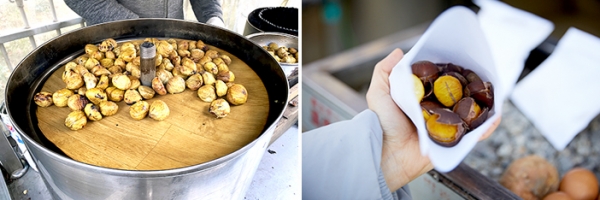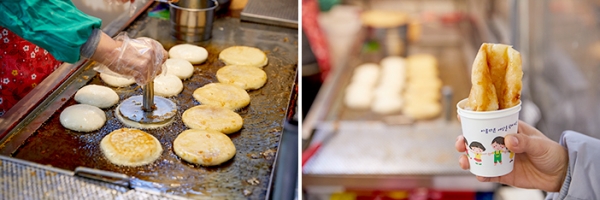With the arrival of winter’s cold bite comes a variety of Korean winter foods. Savory and sweet winter street foods like bungeoppang (carp-shaped bun), hotteok (sugar-filled griddle cake), baked sweet potatoes, and hoppang (steamed bun), just to name a few, are street foods that will warm your hands and hearts. Try these treats, only available in Korea, for a unique Korea experience!
Bungeoppang (붕어빵)

It's easy to find food carts selling bungeoppang on street corners during the cold winter months. Bungeoppang is made by pouring flour dough into the bungeo (carp)-shaped black cast iron mold and filling it with red bean paste. For many Koreans, the sight of freshly baked bungeoppang and its sweet aroma wafting through the air is a signal that winter has truly arrived. Bungeoppang comes in a variety of shapes and flavors, such as ingeoppang (mini-bungeoppang) and bungeoppang filled with choux cream. Prices vary by region, but 3 to 5 bungeoppang usually sell for 2,000 won.
Hoppang (호빵)

Hoppang is a typical Korean winter treat usually warmed in a steamer or microwave before being eaten. Hoppang itself is a take-home version of jjinppang, a stuffed bread sold at snack restaurants in Korea. Both jjinbang and hoppang come in a variety of fillings, including the traditional red bean paste, as well as vegetables, and even pizza! Hoppang derives its name from the Korean onomatopoeia “ho ho” for blowing on hot food and also from the sound of laughter that comes from a family happily eating hoppang together. One bun costs around 1,000 to 2,000 won. This tasty snack can be purchased at nearly any convenience store, small independent grocery store, or neighborhood market.
Gunbam (군밤)

Roasted chestnuts on an open fire bring up the image of city streets decked out for Christmas! In Korea, they’re called gunbam, and they are available all winter long. They have a sweet and savory flavor with smooth texture from being roasted over a low fire for a long time. They are usually sold near traditional markets in small paper bags for 3,000 to 5,000 won.
Tteokbokki (떡볶이)

Tteokbokki (spicy rice cakes) is a widely popular dish in Korea that has a very distinctive spicy, yet sweet, flavor. The main ingredient of tteokbokki is garae tteok, rice cake formed into a long white cylinder shape, which is mixed with eomuk (fish cake) and various vegetables like onions, cabbage, and carrots. The whole thing is then coated in red pepper sauce and served hot. At street stalls, they also provide free cups of hot eomuk broth. Tteokbokki franchise restaurants have also increased in numbers and a wider variety of tteokbokki flavors are available including ones using curry, cheese, and jajang (black soybean sauce). Prices vary by store, but you can generally expect to pay 2,500 to 3,500 won per serving with complimentary refills of eomuk broth at street stalls.
Kkochi eomuk (꼬치어묵)

Yet another street food snack that Koreans like to eat as the temperatures drop is kkochi eomuk, or fish cake skewers. Eomuk is prepared on skewers then boiled in a broth flavored with radishes and kelp. Unlike tteokbokki, eomuk is not spicy and is a great complement to help soothe the spiciness of tteokbokki, and of course it’s the menu to look for when you want to warm up your body quickly. Kkochi eomuk usually cost anywhere from 500 to 1,000 won and are often sold at the same stands as tteokbokki.
Hotteok (호떡)

Hotteok is made with dough from glutinous rice flour and filled with a mix of sugar, peanuts, and cinnamon. The round and flat pancakes are then lightly fried in oil. Some variations include hotteok stuffed with vegetables or seeds. Be careful when you take that first bite; although the brown-sugar filling is delicious, it is often very hot. Like many of the other street foods in Korea, hotteok is a steal at only 1,000 won apiece, although the price may vary by region.
Source: Imagine Your Korea


